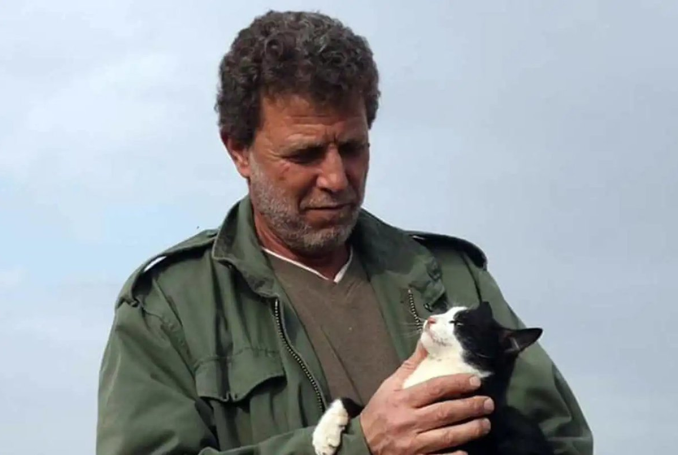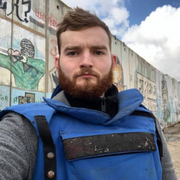
Nael Barghouti, the longest-serving Palestinian political prisoner, is set to be released after 45 years in Israeli detention.
As the longest-serving Palestinian political prisoner Nael Barghouti serves as a symbol of steadfastness against occupation who puts his people first. He is set to be released from military detention but will be expelled from Palestine and prevented from returning to his land in the West Bank.
On October 27, 1957, Nael Saleh Barghouti was born in the village of Kobar, located close to the West Bank city of Ramallah. He grew up in his native village and studied in a local primary school there before later starting his preparatory and secondary education at the Prince Hassan School in the Birzeit area.
While he is well known as an avid reader and student of history, steeped in Palestinian, Arab and Islamic knowledge, his educational journey was abruptly disrupted. In December of 1977, he was arrested and sentenced to a three-month period in a military prison as a teenager, due to his participation in anti-occupation resistance activities.
Then, shortly after Nael Barghouti was released, he, along with brother Omar and their cousin Fakhri Barghouti, were all arrested in April 1978 and received charges related to the killing of an Israeli occupation officer near Ramallah.
Longest-serving Palestinian Prisoner, Nael Al-Barghouthi Transferred to Gilbou Prison
Struggle against the Occupation
However, Barghouti’s struggle against the occupation began much earlier than this, dating back to the June 1967 war when Israel invaded the West Bank to place it under occupation.
At this time, the 10-year-old Barghouti bore witness to the Israeli occupying force invading his village. After the Israeli army reached the gate leading into Kobar, they bombed the entrance, which triggered protests.
In response, Barghouti, joined by other members of his family, took to the roof of their home and chanted against the invading military, using stones to hurl towards them.
As a result of the charge, Barghouti was slapped with a 117-year sentence in military prison. While inside jail, he then joined the Fatah Movement that was leading the Palestine Liberation Organisation (PLO) under its chairman Yasser Arafat.
Initially, Barghouti had attempted to join the Popular Front for the Liberation of Palestine (PFLP). He later emerged as a prominent figure within the prisoner advocacy movement and is known as the Dean of the Palestinian Prisoners.
While part of the Fatah movement, Barghouti decided to break from its ranks in 1983 and join a breakaway group that fell outside the fold of the PLO known as Fatah al-Intifada, founded by Said Muragha. Colloquially known as Abu Musa, Muragha had been the Deputy Chief of Operations for the PLO and led the resistance to Israel’s siege on Beirut in 1982.
Barghouti, like others who splintered off from the PLO to join Fatah al-Intifada, had done so following the disastrous defeat of the Palestinian and Lebanese resistance during Israel’s invasion of Lebanon in 1982.
Israel Transfers Veteran Palestinian Prisoner Nael Barghouti to Desert Prison
Fatah Party leader Yasser Arafat had refused to undergo a reform and reevaluation process after Israel had murdered around 20,000 people in the war, succeeding at forcing the PLO’s leadership and fighters to flee to Tunisia.
After the Palestinian resistance forces agreed to leave Lebanon, Israel then used their fascist Lebanese militia allies to inflict massacres against helpless Palestinian refugees, the worst of which was the Sabra and Shatilla Massacre.
The period between the PLO’s defeat in 1982 and the First Intifada (Uprising) was transformative for not only the imprisoned Barghouti but the Palestinian liberation struggle as a whole, with many growing disillusioned with the Fatah Movement.
During this time in the 1980s, what is known as the “War of the Camps” ensued inside Lebanon, by the end of which many groups had lost their relevance, including Fatah al-Intifada. This led to Barghouti joining the newly emerging Islamic Resistance Movement (Hamas), which emerged in 1987 with a new vision.
‘Love behind Bars’
After suffering both physical and psychological abuse over a 33-year-long detention in an Israeli military jail, Barghouti was finally freed in 2011 as a result of the Hamas-Israel prisoner exchange known as the Wafa al-Ahrar Deal.
His father had died in 2004 and his mother in 2005, both of which he was barred from visiting prior to their deaths, while he was prevented from attending their funerals.
Yet, what did emerge as a light in the darkness of his love story with the woman he would finally be able to marry and call his wife in November of 2011, Iman Nafeh. Nafeh had herself been sentenced to prison while she was a student, for a period of 15 and a half years:
“Like me, Nael was only a high school student when he was arrested. But, unlike me, his accusation was far more serious…Although he was released in a prisoner exchange in 2011 after spending 34 uninterrupted years in Israeli jails, he was arrested again, along with 70 other freed prisoners. The Israeli government has decided to reinstate the 117 year sentence”, she explained in the book These Chains Will Be Broken, edited by Palestinian intellectual Ramzy Baroud.
‘Love Behind Bars’ – The Story of Palestinian Prisoner Nael al-Barghouti
“Two weeks after Nael was released, we began the wedding preparations, to be fully betrothed two months later. He was so desperate to claim a sense of normalcy in his life; he returned to farming his land in the village of Kobar near Ramallah, as soon as he was free. Sadly, the soldiers came back for him before he harvested what he had sown,” she added.
His rearrest came in 2014 without any basis and in violation of the prisoner exchange agreement that had been concluded between Israel and Hamas. The official reason that was given by the Israeli occupation’s military court system was that he gave a speech at Birzeit University.
At the time, as mentioned by his wife, Barghouti had chosen to work his land and also enrolled to study history at al-Quds University.
As the Israeli military court maintains a conviction rate of roughly 99.7%-99.9%, it is widely regarded as a kangaroo court with no legitimacy and concludes rulings in contravention of international law. Therefore, the 117-year sentence was reinforced with no due process and based upon baseless accusations.
‘Three-Hour Assault’
Since his re-arrest, Barghouti has been a prominent figure within the prisoner movement once again and holds the title as the longest-serving political prisoner.
In early 2021, when Palestinian Authority leader Mahmoud Abbas declared his intention to host national elections, before later canceling them upon it becoming clear that his Fatah faction would lose, Barghouti had actually joined the Hamas-led ‘Jerusalem Is Our Promise’ legislative election list.
In December of 2023, he was also subjected to an infamous assault, which became known as the “Three Hour Assault”, during which Israeli prison guards had profusely beaten him for hours, inflicting severe fractures and bruising to his rib cage and chest. He has also been deprived of food for prolonged periods and suffered immense physical and psychological torture.
Gruesome Torture at Hands of Israeli Forces Emerge – Palestinian Prisoner Groups
Instead of allowing for his release so that he can once again return to his farmlands in the village of Kobar, he will now reportedly be deported outside of occupied Palestine altogether.
His wife, who has been waiting for him all these years will have to travel outside of the West Bank to visit him, yet the Israeli authorities have been preventing the families of the deported prisoners from leaving the territory.
Due to the intense mistreatment he has been subjected to, it is possible that he could rise as a prominent voice in the future of the Palestinian liberation struggle.
(The Palestine Chronicle)

– Robert Inlakesh is a journalist, writer, and documentary filmmaker. He focuses on the Middle East, specializing in Palestine. He contributed this article to The Palestine Chronicle.